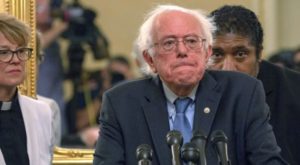
Instead of arguing for a “single-payer health care system,” the latest Leftist rallying cry has been for “Medicare for all.” Of course, all that’s changed is the branding, as both programs would be more-or-less the same; offering universal healthcare through socialized medicine.
But what would it all cost?
A handful of liberals are misinterpreting a new study from George Mason University’s Mercatus Center (which is partially funded by the Koch Brothers) and claiming that the study proves Medicare for all would save $2 trillion. Bernie Sanders released a video, sarcastically thanking the Kochs for proving Medicare for all would save money. The Mercatus study was on a Medicare for all plan built to the specifications that Sanders proposes.
Thank you, Koch brothers, for accidentally making the case for Medicare for All! pic.twitter.com/speuEL6ETC
— Bernie Sanders (@SenSanders) July 30, 2018
In response, the study’s authors have confirmed that no – their study does not conclude that Medicare for all would save $2 trillion. As Glenn Kessler at the Washington Post noted, what Sanders sees as a “$2 trillion in savings” is only under an extremely unrealistic “best case scenario” type situation. The Mercatus study’s authors “decided to follow the text of the Sanders plan and assume that providers — doctors, hospitals, drug companies and the like — would face an immediate cut of 40 percent in their payments. That, in theory, would reduce the country’s overall level of health expenditures by $2 trillion from 2022 to 2031.”
So yes, Bernie’s healthcare plan will save money….. if you assume everyone employed in the medical industry would immediately be A-OK with a 50% pay cut overnight. And even that’s being generous, as there are zero cases in which government healthcare programs came in under cost. In 1965 the House Ways and Means Committee predicted that Medicare could cost $12 billion a year by 1990. In reality, it cost $98 billion. In 1987, Congress projected that Medicaid’s special relief payments to hospitals would be less than $1 billion by 1992. Actual cost: $17 billion.
Getting to Canada-style health care costs would require cutting doctor salaries a lot (33 percent for primary care, 52 percent for ortho surgeons).
That's fine, they'll live, but it's important not to undersell the political difficulty.https://t.co/cMK7ptfYKH pic.twitter.com/mDPKPswtkx
— Dylan Matthews (@dylanmatt) August 6, 2018
Furthermore, Sanders proposal would only save money if it simultaneously reduced demand for health care by 11 percent, while insuring an additional 30 million Americans (most estimates put the uninsured at 44 million, but that includes non-citizens). So Sanders proposal forces us to make two main assumptions; that not only will these 30 million newly insured not use their healthcare, those already insured will use 11 percent less healthcare.
Sound impossible? Because it is.
Even the far-left website Vox, which does favor these kind of socialist programs, admits that they come with a price tag most Americans simply are not comfortable with. In addition to Bernie’s Medicare for all plan, which would cost $32 trillion over 10 years (best case scenario), his “free college” plan would cost $800 billion over ten years, his paid leave plan would cost $270 billion, among others.
If Bernie Sanders were granted every Santa Claus program he wanted, according to Vox, “The 30-year projected tab for these programs is even more staggering: new proposals costing $218 trillion, on top of an $84 trillion baseline deficit driven by Social Security, Medicare, and the resulting interest costs.” By the way, an editorial in the conservative-leaning Wall Street Journal editorial section during the 2016 campaign estimated Bernie’s proposals would cost an additional $18 trillion over the next decade.
While liberals blasted the study, ironically it’s the leftists at Vox who found that in reality, the programs would cost more. Hundreds of trillions more.
